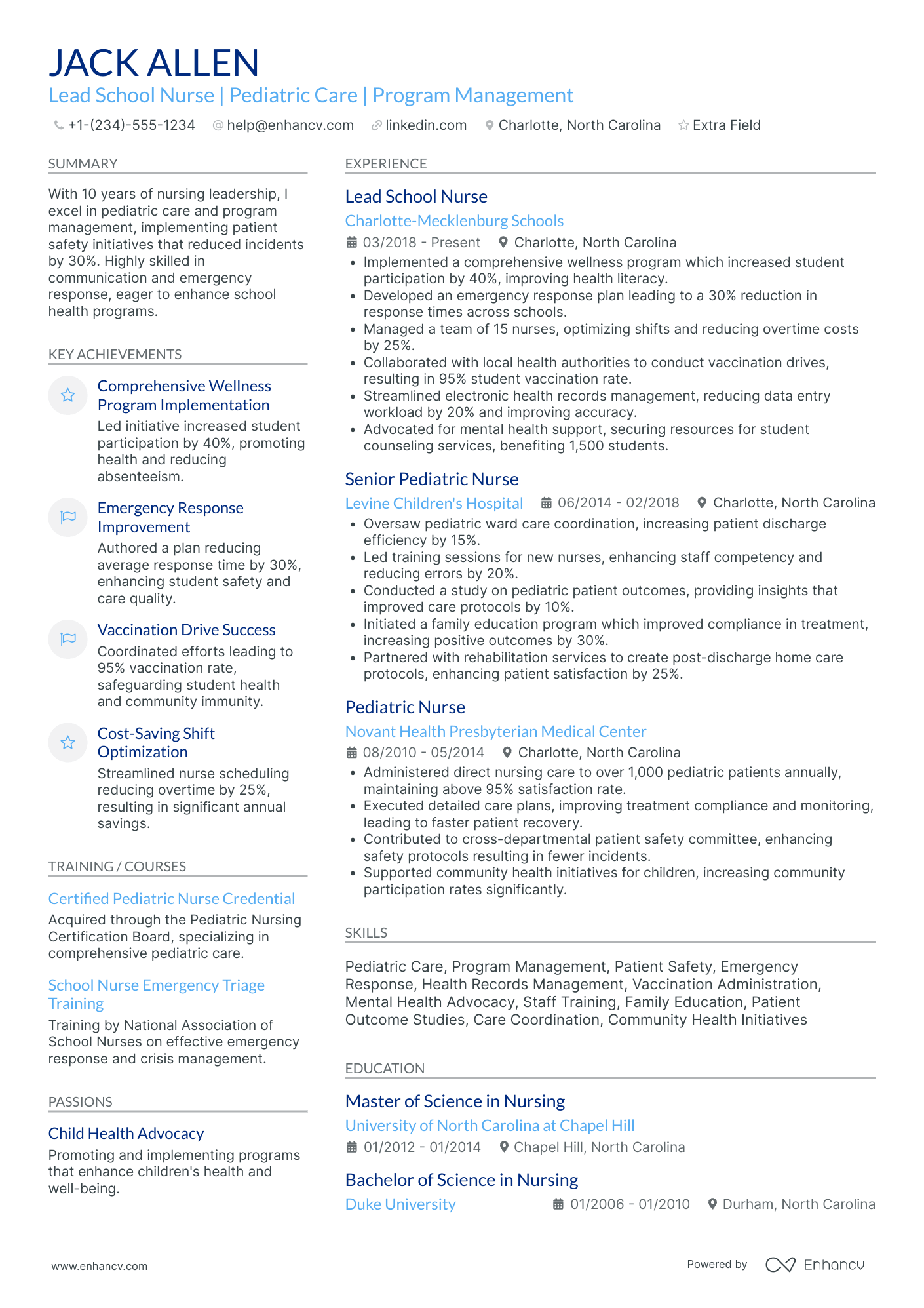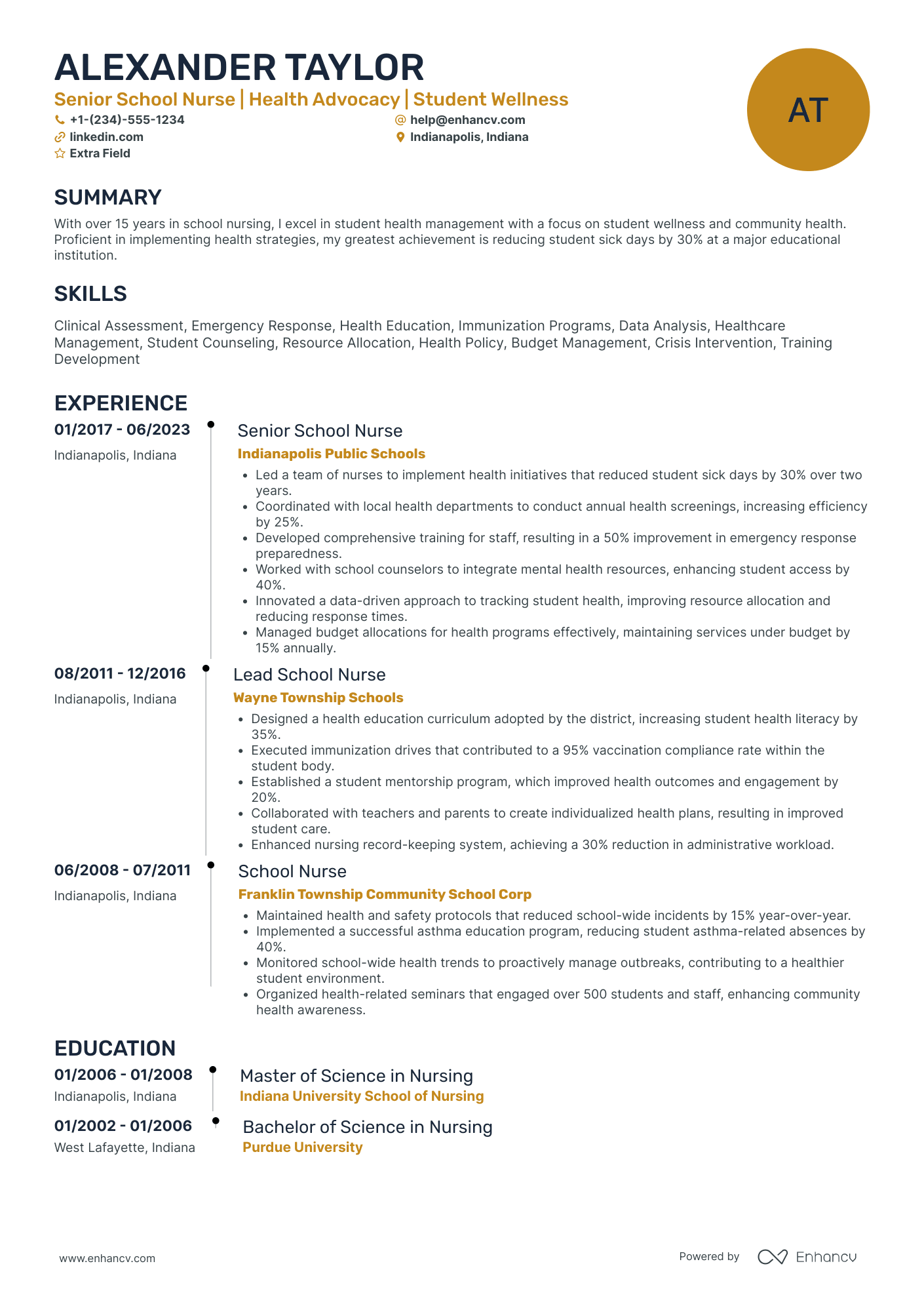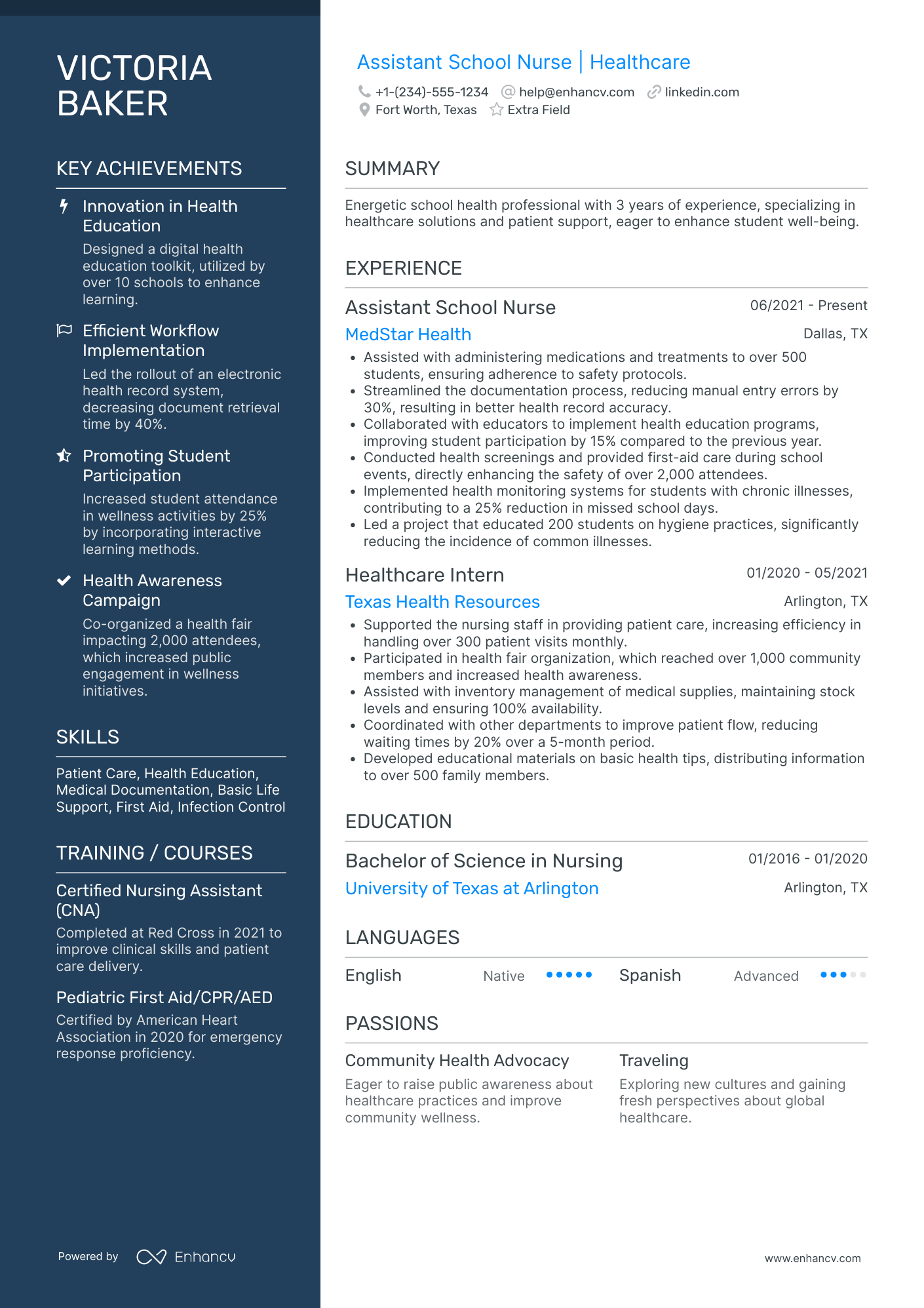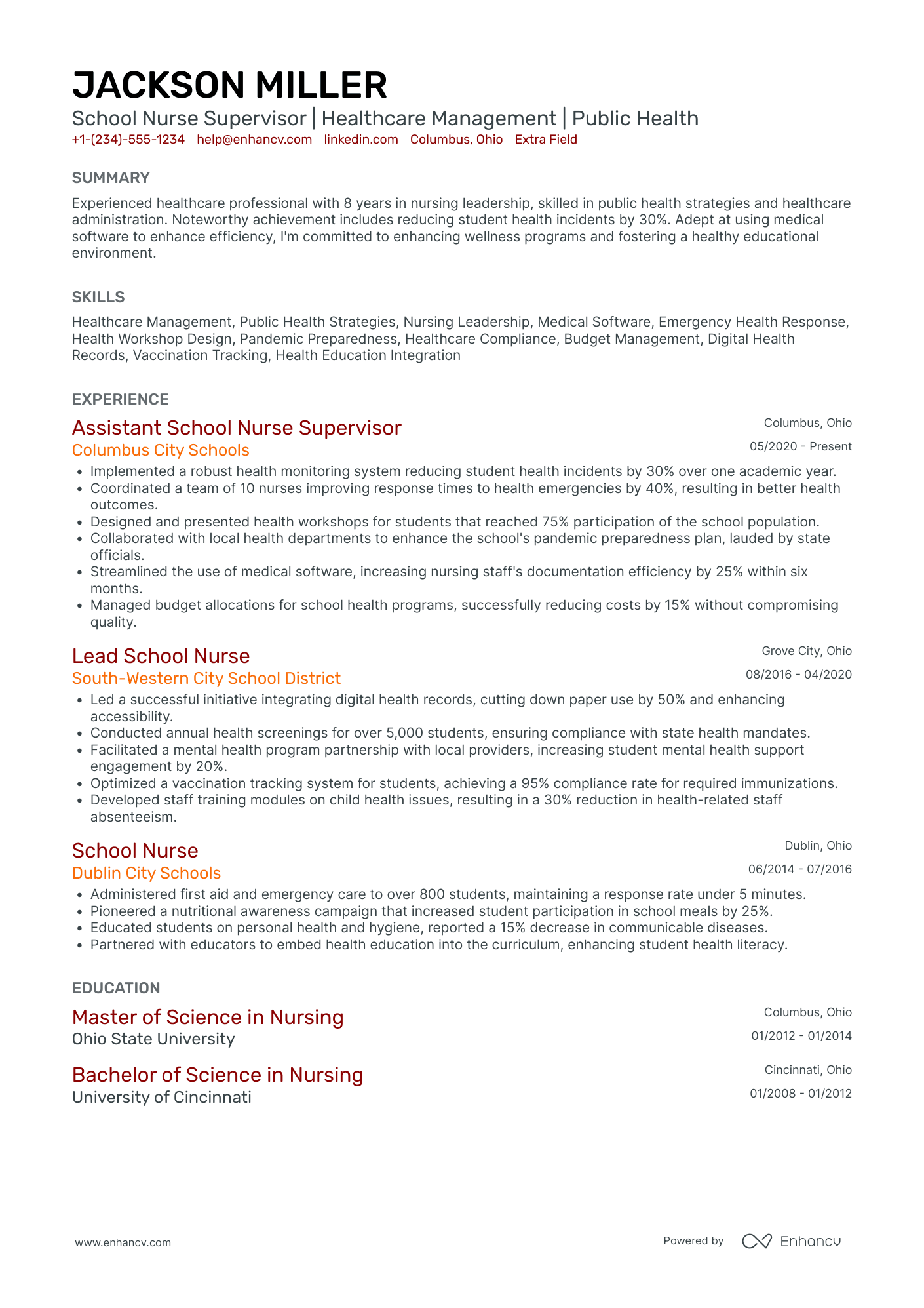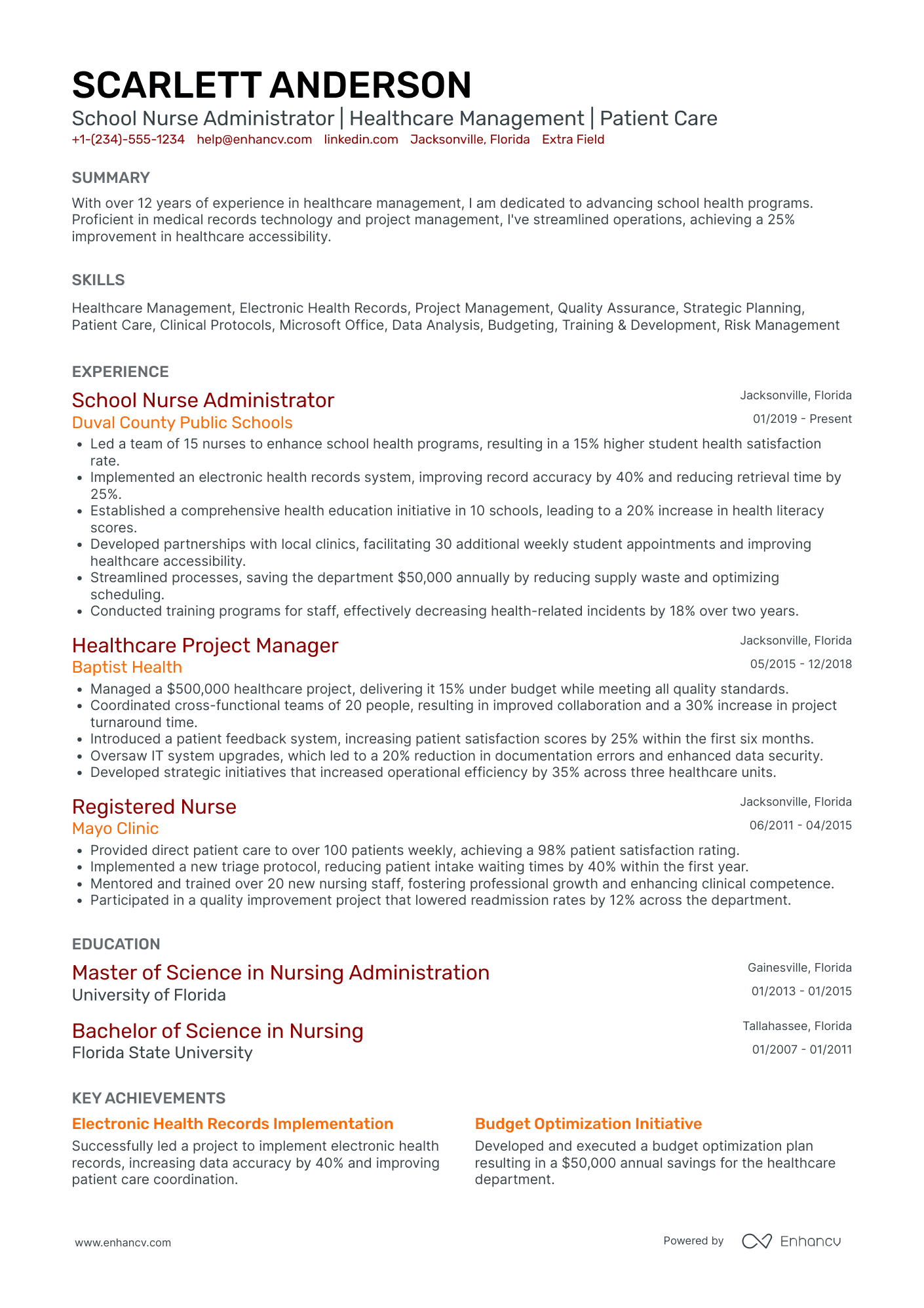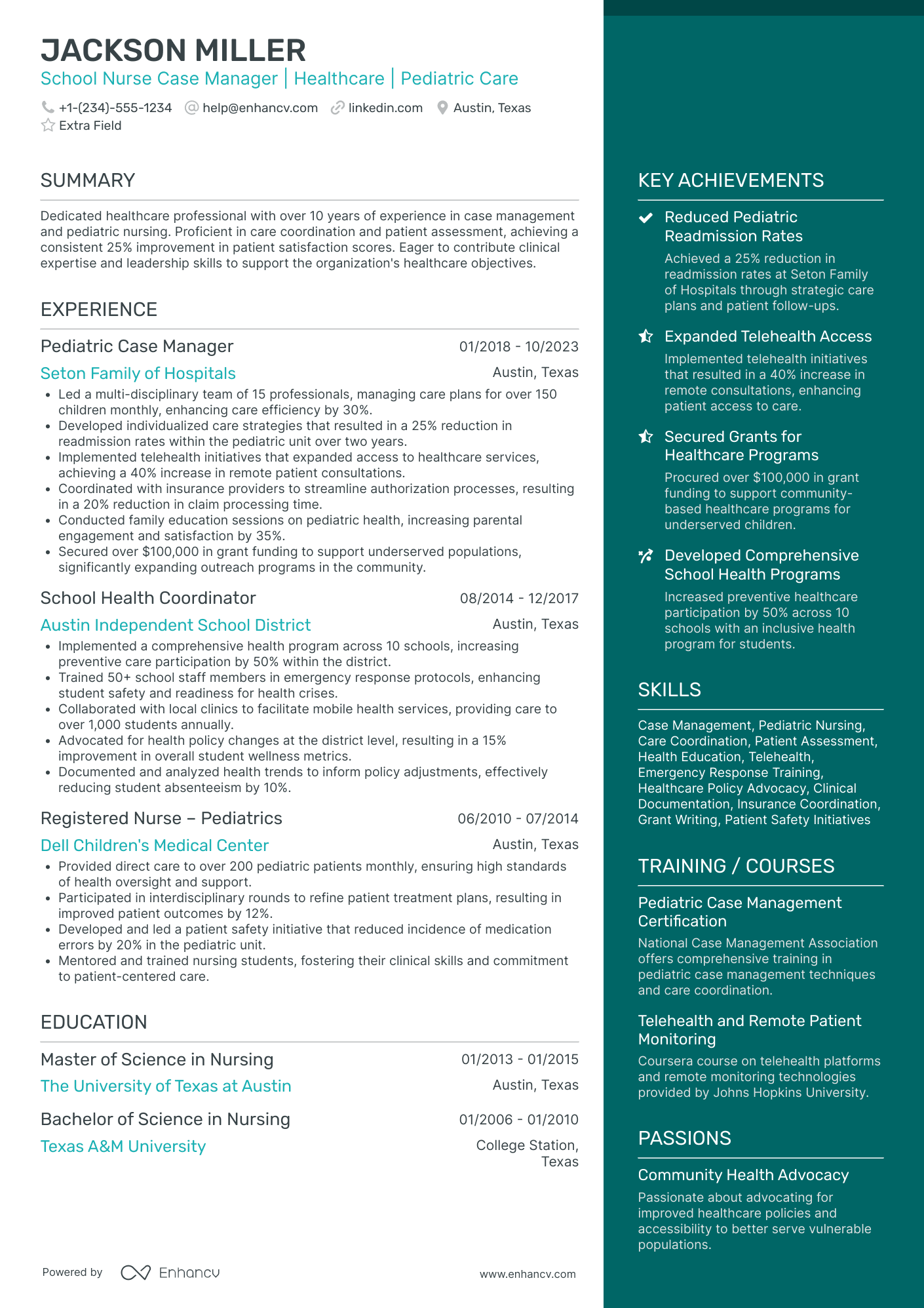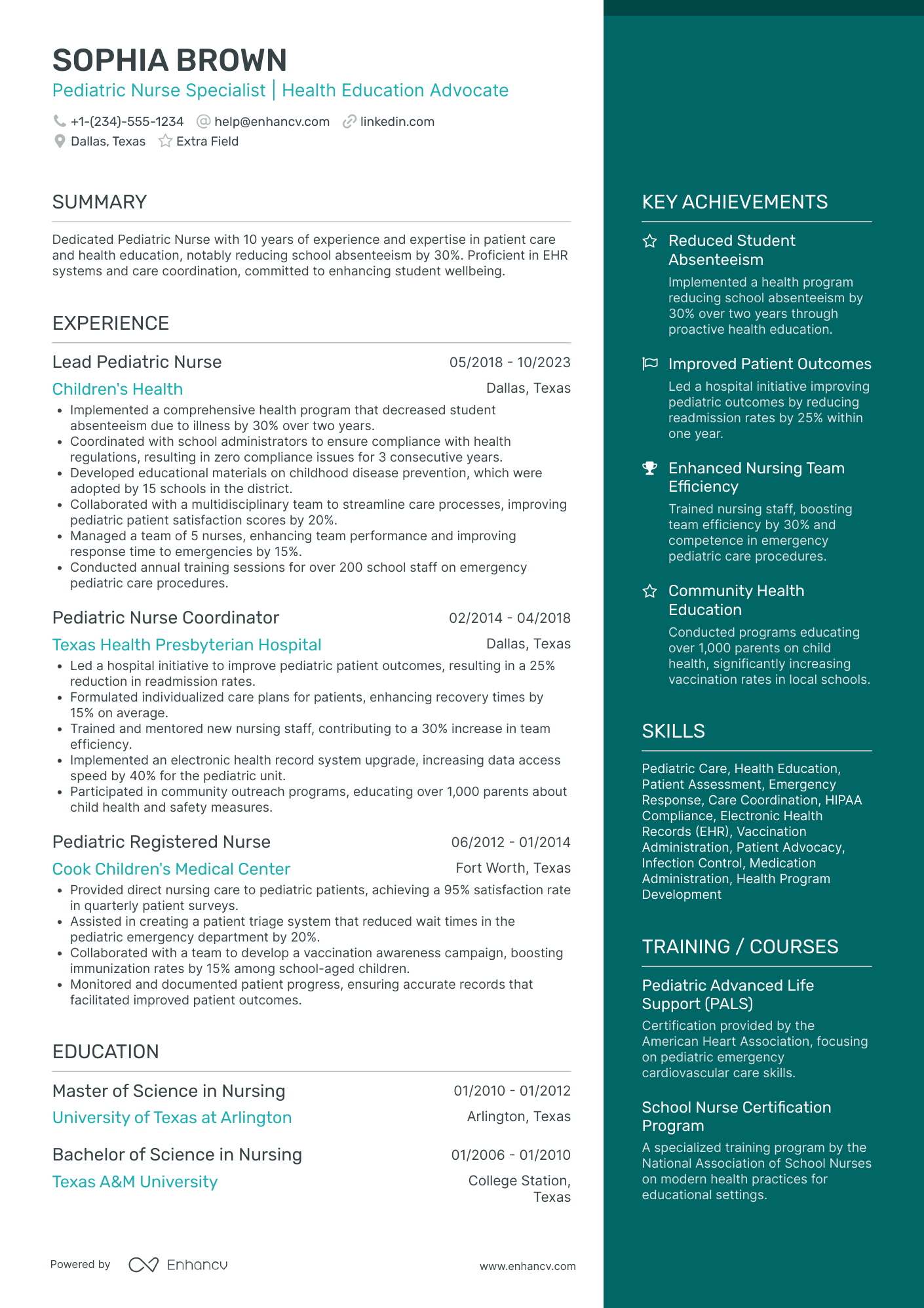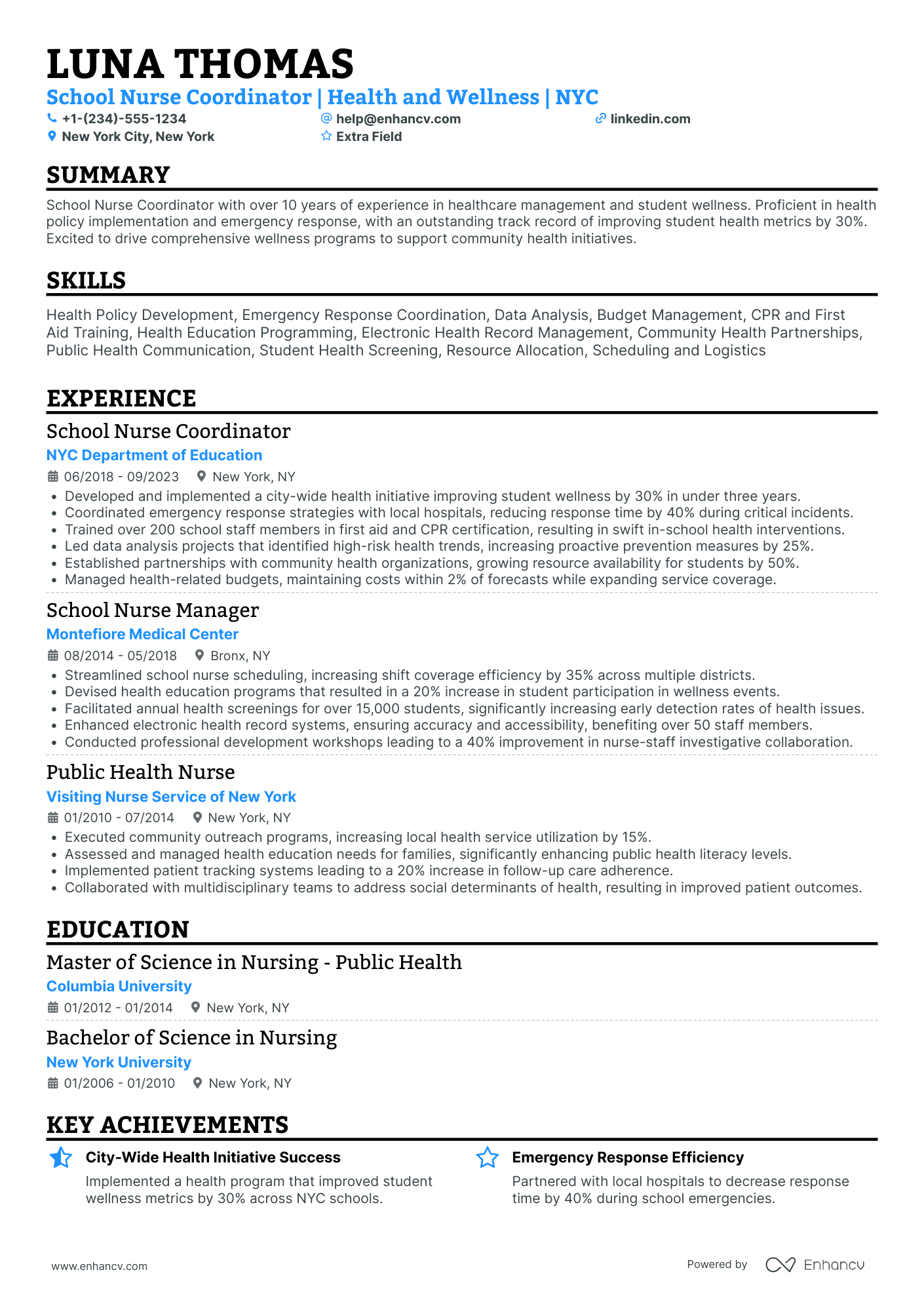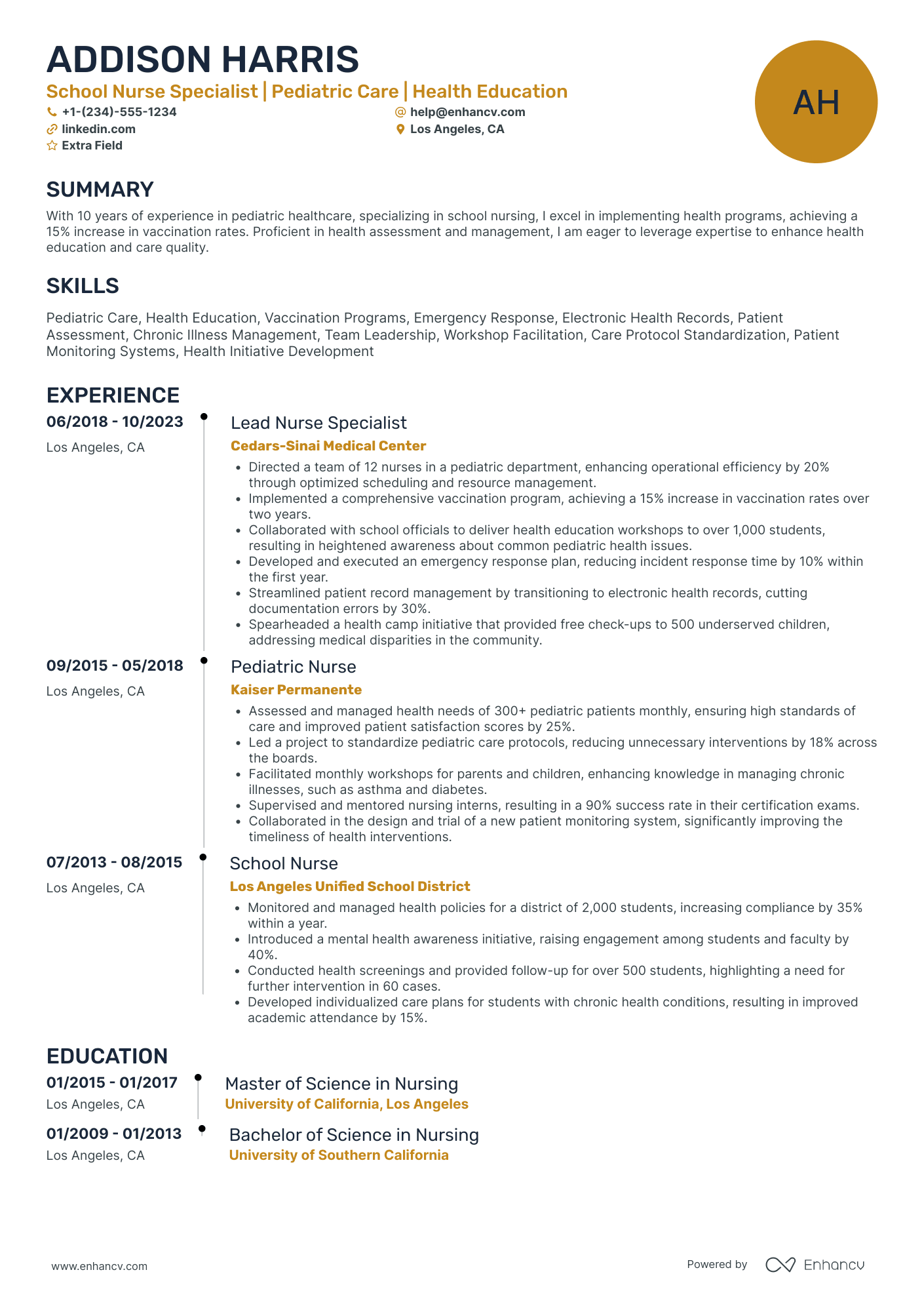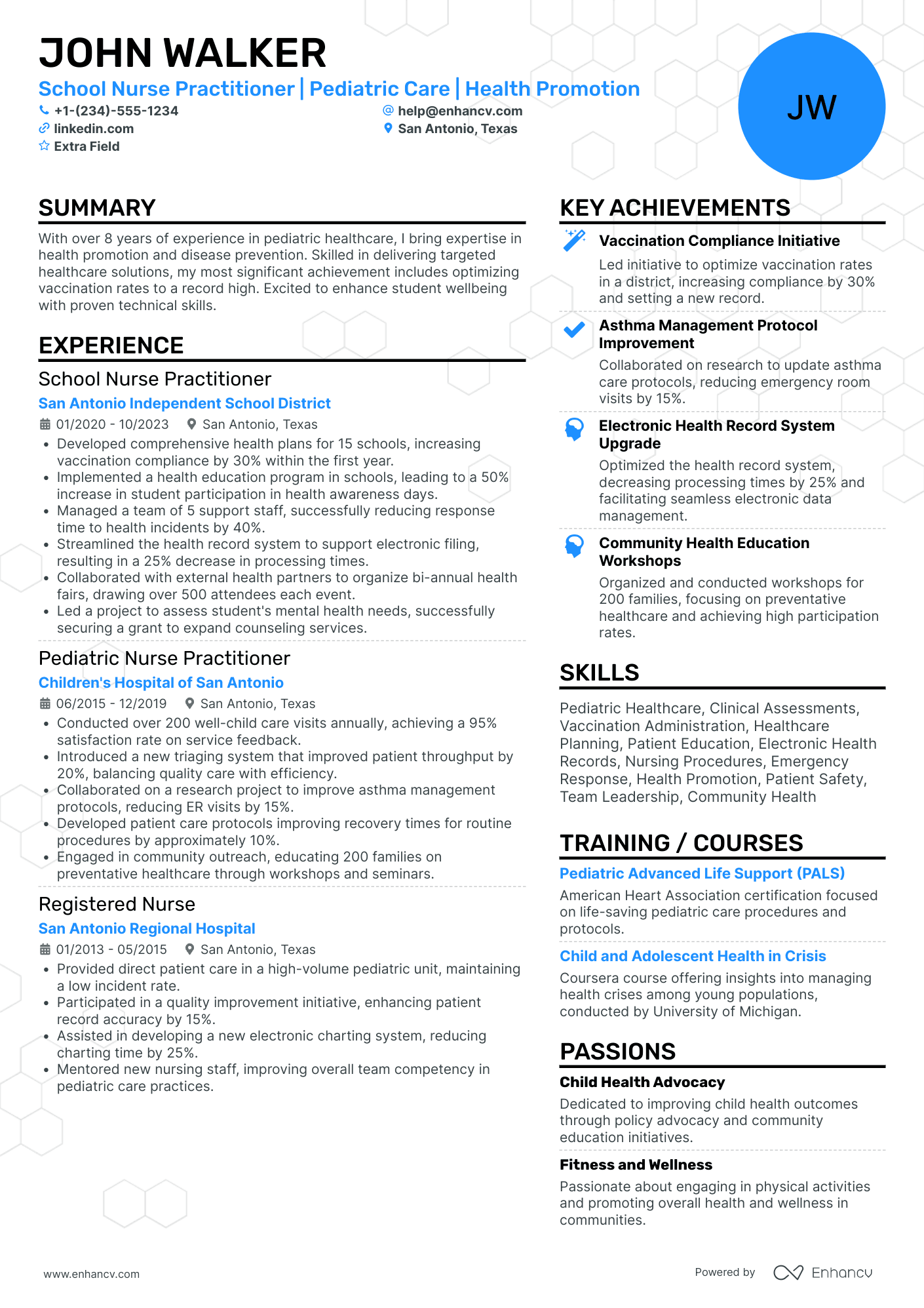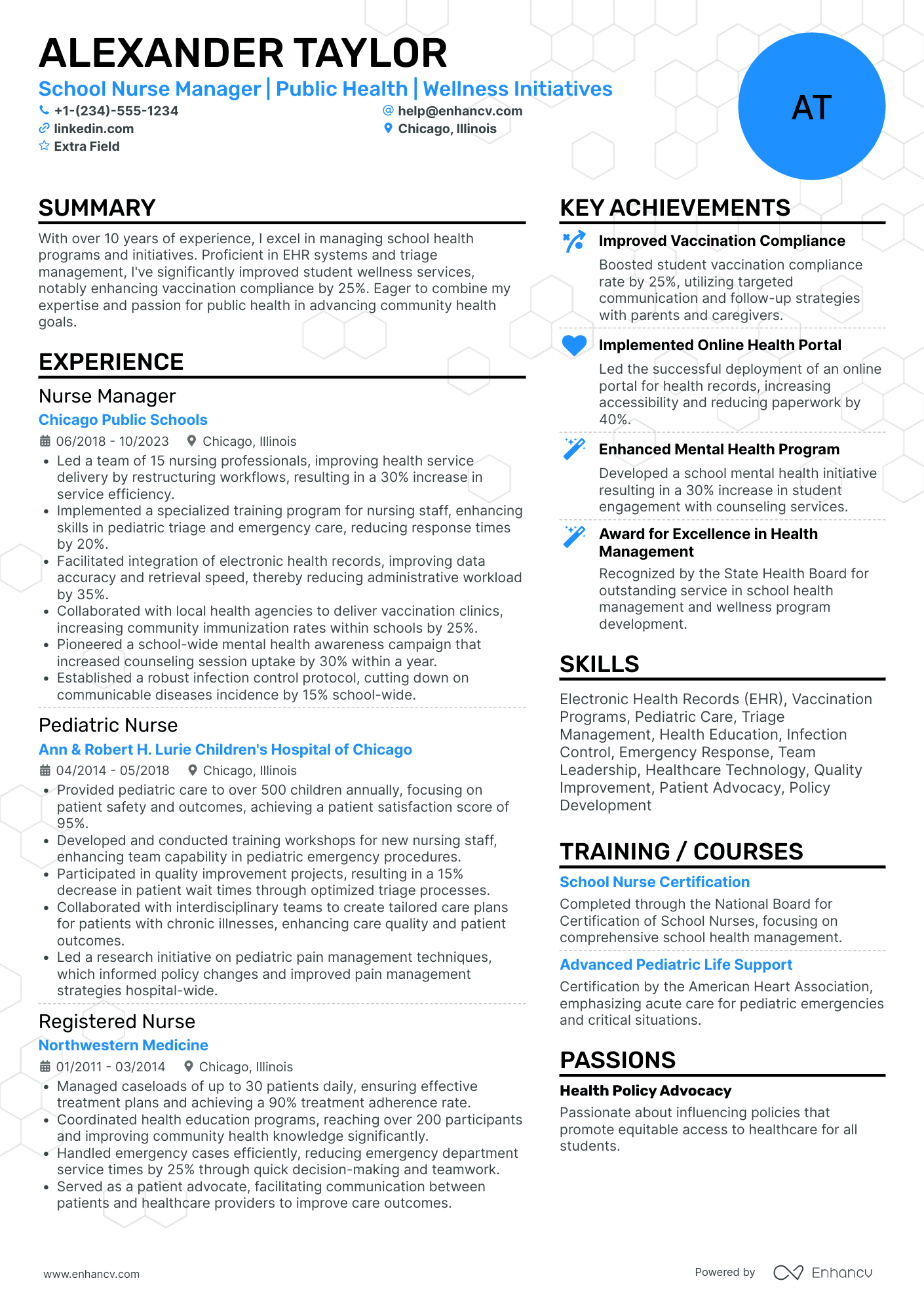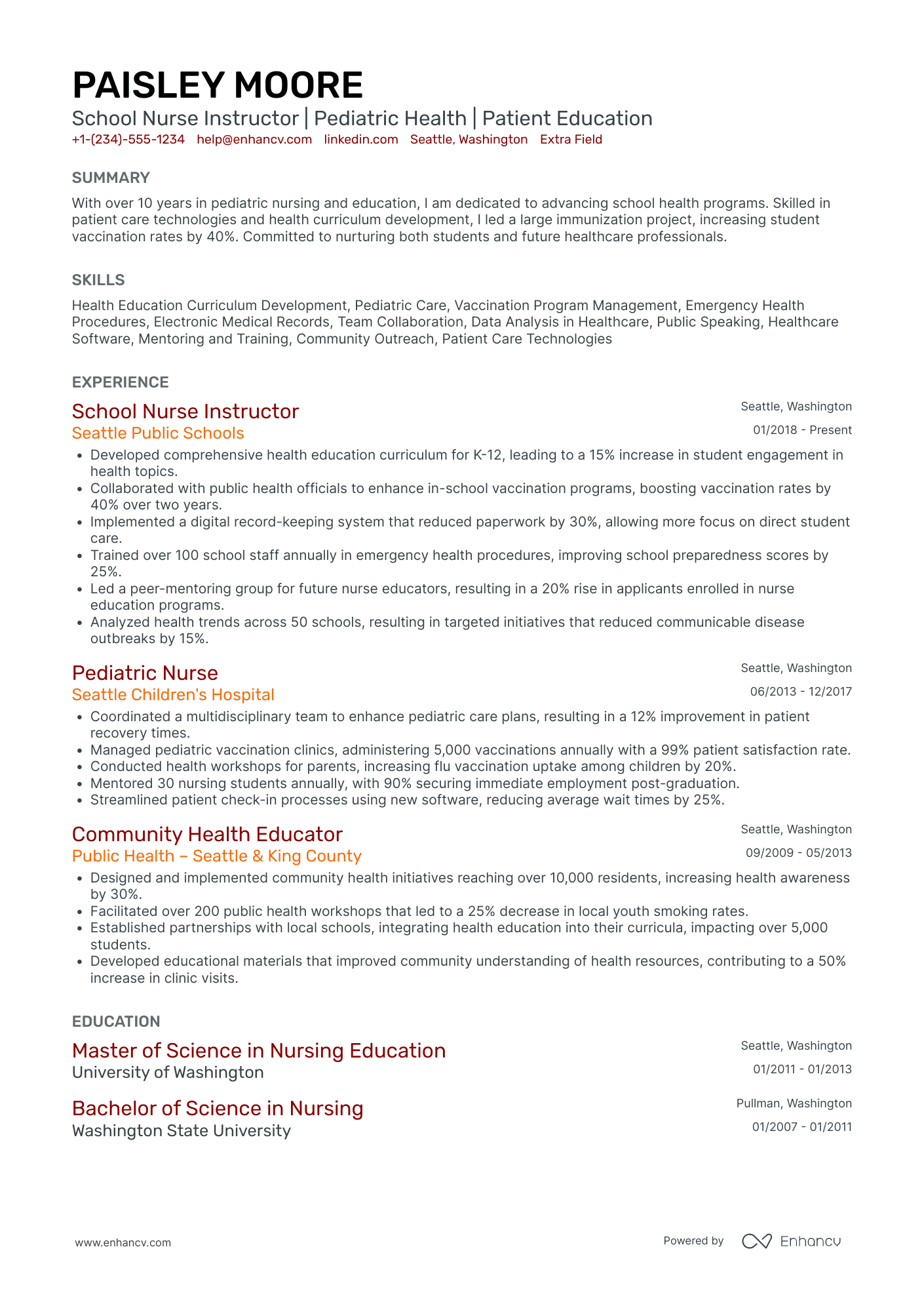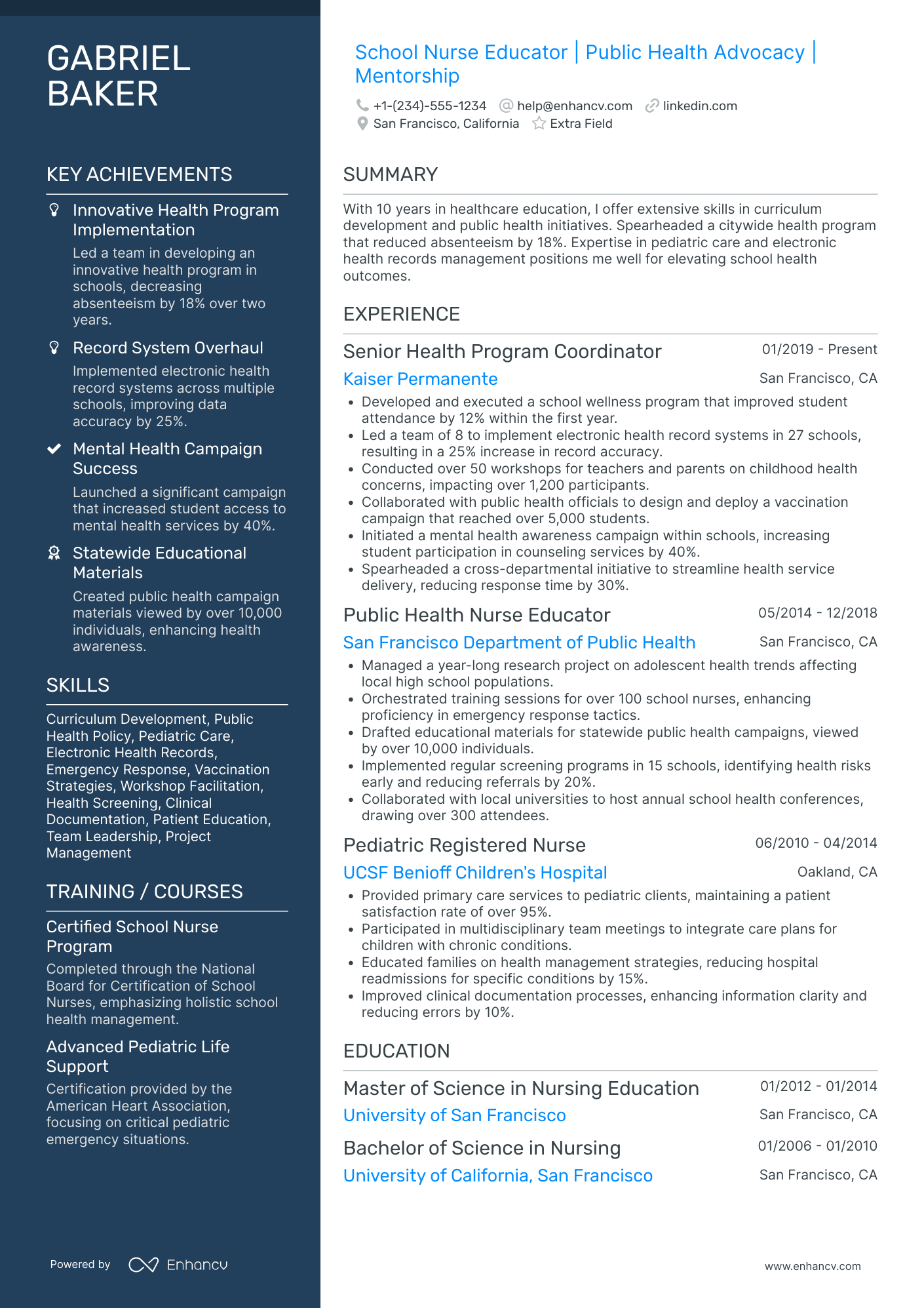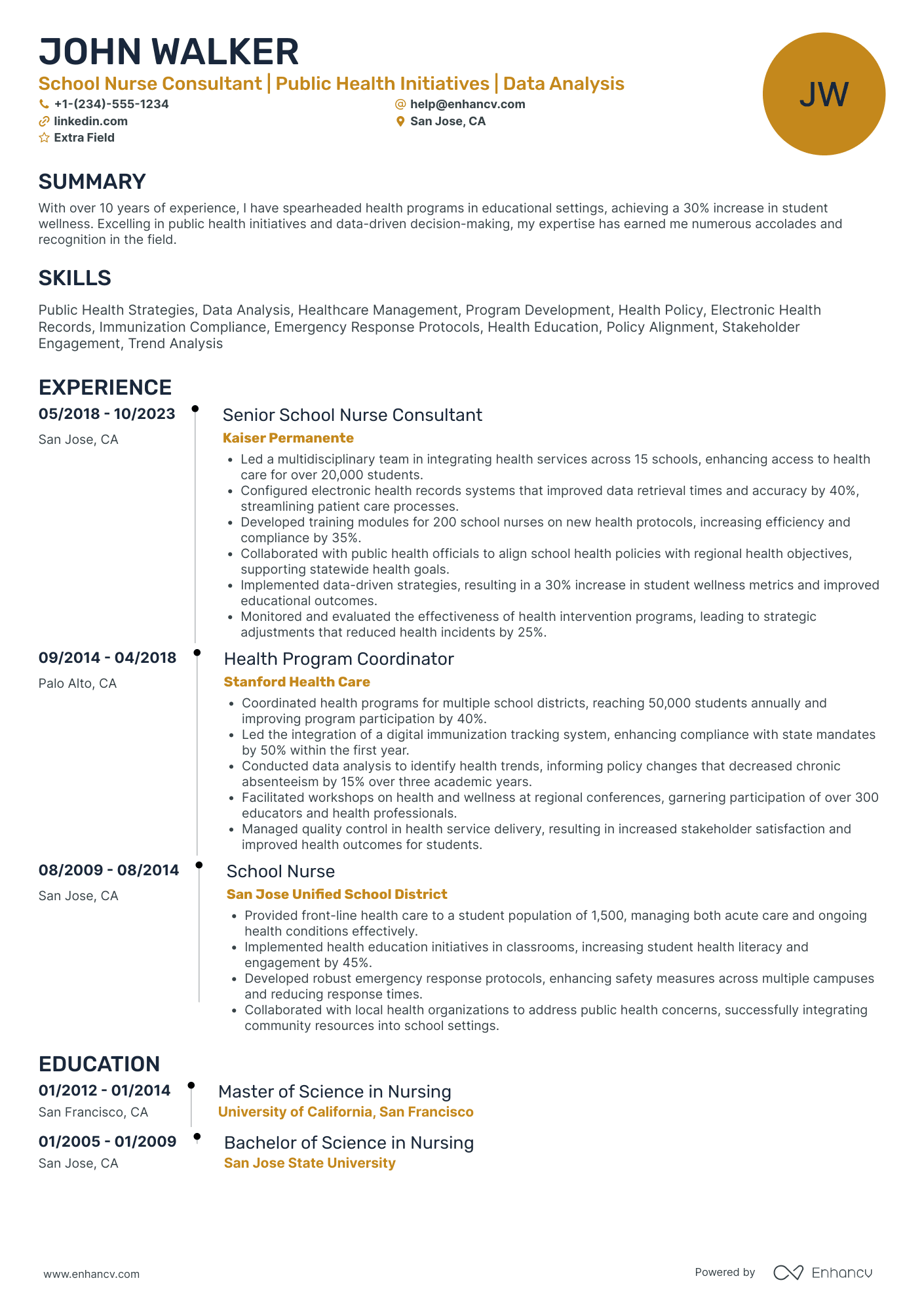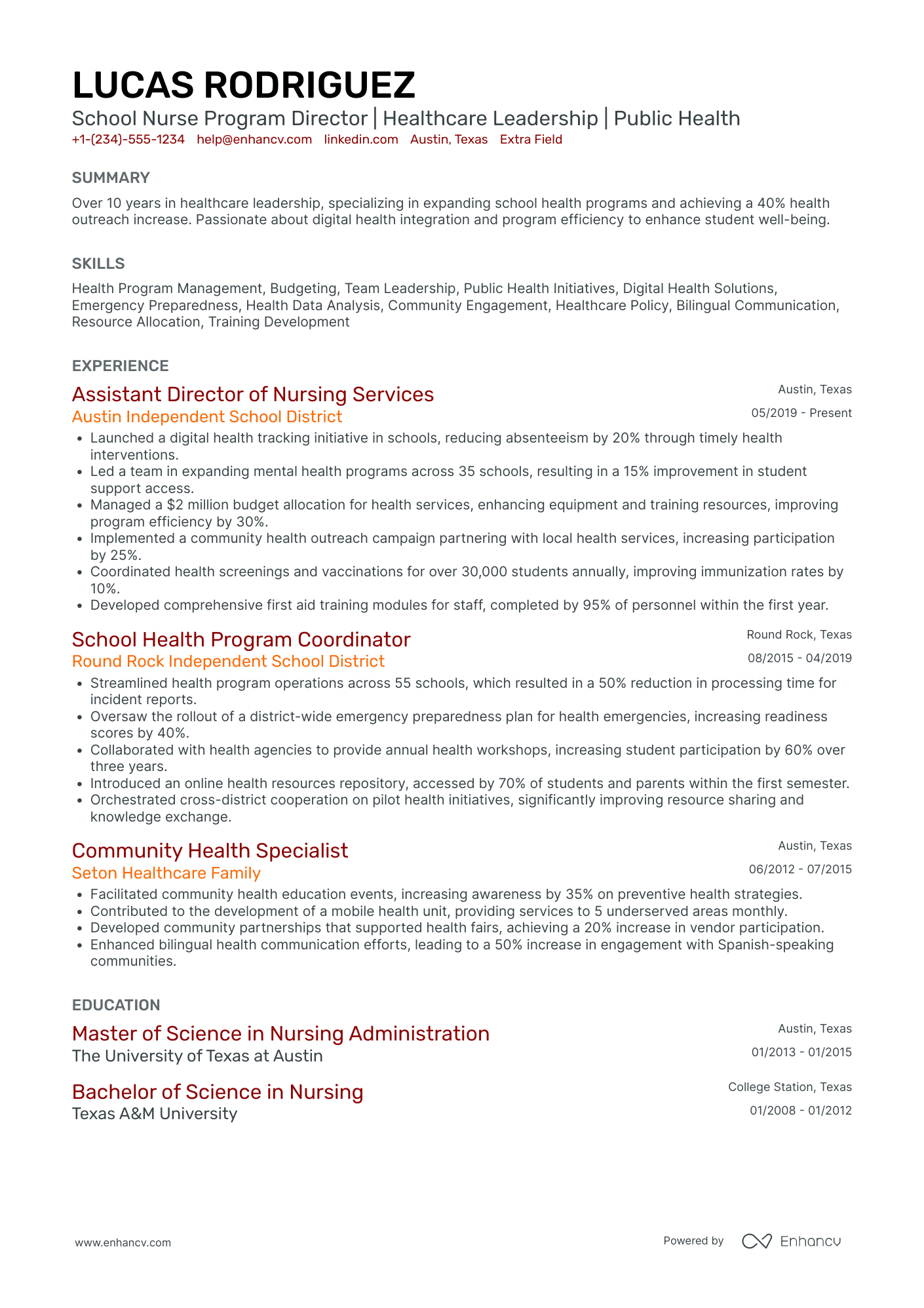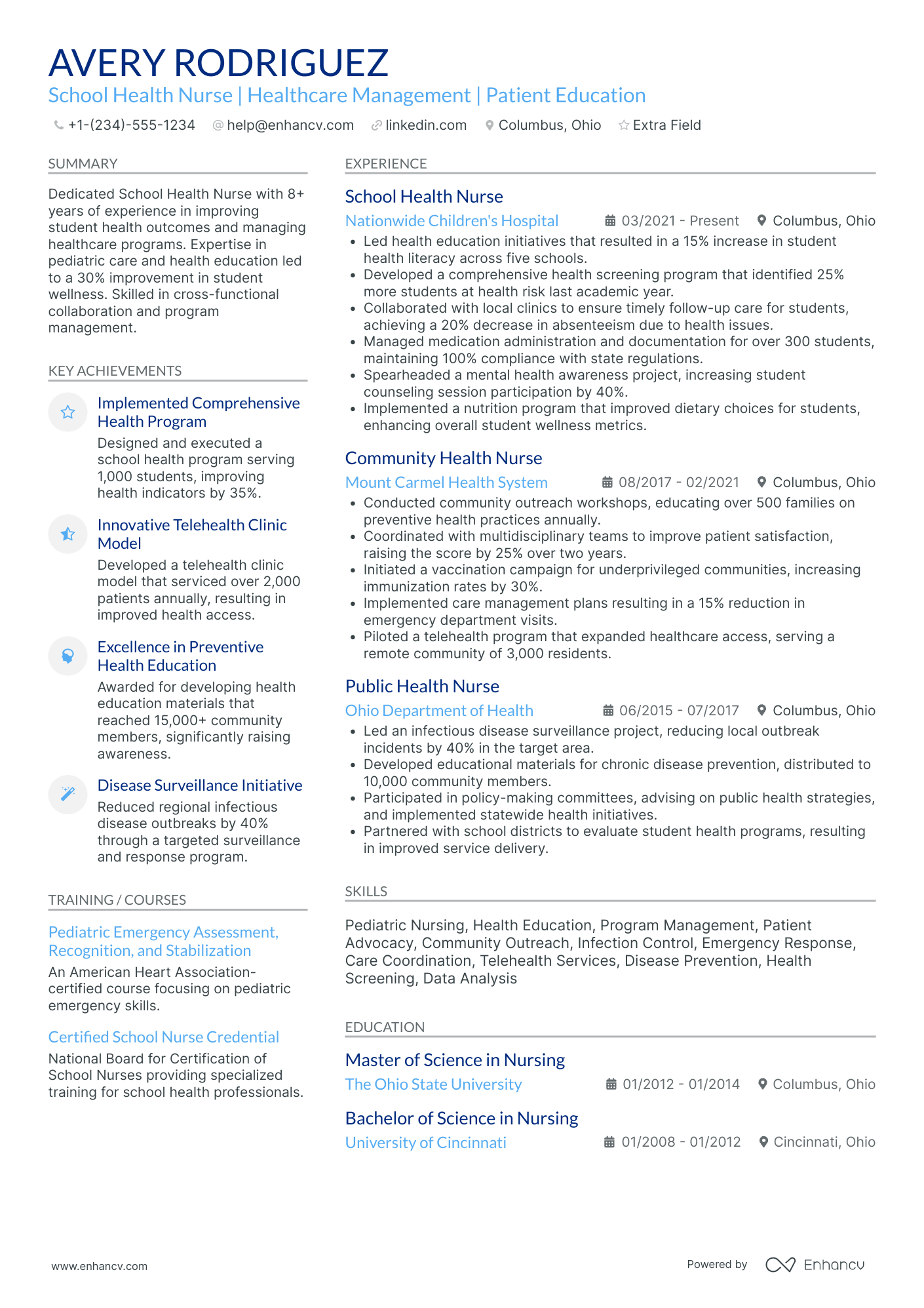As a school nurse, your resume challenge may involve effectively highlighting the unique blend of healthcare expertise and student interaction skills you possess. Our guide can assist you by showcasing strategies tailored to reflect your comprehensive nursing competencies and compassionate approach to student care within the educational environment.
- Sample industry-leading examples to learn how to write your best resume yet.
- Improve the experience, education, and achievements section of your resume with insights from resume-writing professionals.
- Curate your technical expertise and personality to stand out amongst the pool of candidates.
- Succinctly focus on your unique skill set all through your school nurse resume.
If the school nurse resume isn't the right one for you, take a look at other related guides we have:
School nurse resume format made simple
You don't need to go over the top when it comes to creativity in your school nurse resume format .
What recruiters care about more is the legibility of your school nurse resume, alongside the relevancy of your application to the role.
That's why we're presenting you with four simple steps that could help your professional presentation check all the right boxes:
- The reverse-chronological resume format is the one for you, if you happen to have plenty of relevant (and recent) professional experience you'd like to showcase. This format follows a pretty succinct logic and puts the focus on your experience.
- Keep your header simple with your contact details; a headline that details the role you're applying for or your current job; and a link to your portfolio.
- Ensure your resume reaches an up-to-two-page limit, only if you happen to be applying for a more senior role or you have over a decade of relevant experience.
- Save your school nurse resume as a PDF to retain its structure and presentation.
Align your resume with the market’s standards – Canadian resumes may have unique layout guidelines.
Upload & Check Your Resume
Drop your resume here or choose a file. PDF & DOCX only. Max 2MB file size.
PRO TIP
List your educational qualifications and certifications in reverse chronological order.
Essential sections that should make up your school nurse resume include:
- The header - with your contact details (e.g. email and telephone number), link to your portfolio, and headline
- The summary (or objective) - to spotlight the peaks of your professional career, so far
- The experience section - with up to six bullets per role to detail specific outcomes
- The skills list - to provide a healthy mix between your personal and professional talents
- The education and certification - showing your most relevant degrees and certificates to the school nurse role
What recruiters want to see on your resume:
- Demonstrated experience in pediatric or school nursing, showcasing the ability to handle common youth health issues.
- Current nursing licensure and certifications such as CPR/AED, and any additional qualifications like Certified school nurse (CSN).
- Knowledge and experience in implementing school health programs and understanding of state school health regulations.
- Skills in health education, counseling, and wellness promotion among children and adolescents.
- Strong communication and interpersonal skills to interact effectively with students, parents, teachers, and other school staff.
Guide to your most impressive school nurse resume experience section
When it comes to your resume experience , stick to these simple, yet effective five steps:
- Show how your experience is relevant by including your responsibility, skill used, and outcome/-s;
- Use individual bullets to answer how your experience aligns with the job requirements;
- Think of a way to demonstrate the tangible results of your success with stats, numbers, and/or percentages ;
- Always tailor the experience section to the school nurse role you're applying for - this may sometimes include taking out irrelevant experience items;
- Highlight your best (and most relevant) achievements towards the top of each experience bullet.
You're not alone if you're struggling with curating your experience section. That's why we've prepared some professional, real-life school nurse resume samples to show how to best write your experience section (and more).
- Developed and implemented a comprehensive student health program for a district with over 10,000 students, which decreased overall student sick days by 15%.
- Collaborated with a multidisciplinary team to manage care for students with chronic conditions, increasing their attendance by 20%.
- Led training sessions for staff on emergency response techniques, improving preparedness scores by 25% as measured by annual simulations.
- Managed health screenings for vision, hearing, and scoliosis for approximately 2,000 students yearly, referring 10% to specialists for further evaluation.
- Coordinated with local health departments to conduct flu vaccination clinics for students and staff, vaccinating an average of 800 individuals each year.
- Developed individualized healthcare plans for 50+ students with special needs, ensuring their safety and access to education.
- Implemented an electronic health record system, reducing time spent on documentation by 30% and improving the accuracy of student health data.
- Facilitated health education programs that addressed teenage pregnancy, drug abuse, and nutrition, resulting in a 10% drop in related student incidents.
- Conducted CPR and first-aid certification courses for faculty, certifying 100+ teachers and contributing to a safer school environment.
- Spearheaded a mental health awareness program that increased the identification of at-risk students by 40%.
- Initiated a peer counseling project involving cross-age leadership, with 50 senior students mentoring underclassmen, leading to a more cohesive student body.
- Managed the response to a mumps outbreak in the school, containing the spread to fewer than 10 cases through swift vaccination and awareness campaigns.
- Oversaw daily medication administration to around 100 students with prescriptions, maintaining flawless compliance with pharmaceutical guidelines.
- Implemented a hygiene education program for lower grades which reduced the incidence of communicable diseases in the school by 20%.
- Provided emergency medical care during school-sponsored events, ensuring student and staff safety at all times.
- Lead the integration of telehealth services, which bolstered access to healthcare for remote students and resulted in a 25% increase in healthcare consultations.
- Streamlined immunization tracking for regulatory compliance, achieving a 98% immunization rate amidst changing state vaccine requirements.
- Orchestrated the school's response to the COVID-19 pandemic, instituting safety protocols that minimized disruption to learning.
- Designed and executed a comprehensive allergen-awareness program that reduced allergic incidents by over 50% across the school population.
- Organized an annual health wellness fair, attracting over 20 local health vendors and benefiting the broader school community's health and wellness.
- Collaborated closely with counseling staff to provide holistic support to students, significantly improving student reported well-being metrics by 30%.
- Established a proactive lice prevention and control program which led to a 90% decrease in reported cases year-over-year.
- Partnered with local dental clinics to facilitate annual oral health checks for over 1,500 students, promoting preventive care and oral hygiene.
- Engaged in advocacy and policy development for improved student health services resulting in the approval of a budget for a full-time mental health counselor.
The following content includes information from "O*NET OnLine" by the U.S. Department of Labor, Employment and Training Administration (USDOL/ETA). Used under the CC BY 4.0 license. The data represents the top responsibilities present on the task lists for school nurse professionals.
Top Responsibilities for School Nurse:
- Record patients' medical information and vital signs.
- Administer medications to patients and monitor patients for reactions or side effects.
- Maintain accurate, detailed reports and records.
- Monitor, record, and report symptoms or changes in patients' conditions.
- Provide health care, first aid, immunizations, or assistance in convalescence or rehabilitation in locations such as schools, hospitals, or industry.
- Consult and coordinate with healthcare team members to assess, plan, implement, or evaluate patient care plans.
- Direct or supervise less-skilled nursing or healthcare personnel or supervise a particular unit.
- Instruct individuals, families, or other groups on topics such as health education, disease prevention, or childbirth and develop health improvement programs.
- Modify patient treatment plans as indicated by patients' responses and conditions.
- Conduct specified laboratory tests.
Quantifying impact on your resume
- Mention the number of students and staff in the school to demonstrate the scale of your responsibility.
- Specify the percentage of health care cost reduction you achieved through efficient inventory management.
- Include the number of health and wellness initiatives you introduced to show innovative thinking.
- Detail the frequency of health screenings conducted to highlight preventative care efforts.
- State the number of emergency situations handled to emphasize crisis management skills.
- Quantify the average number of daily or annual student consultations to provide a scope of your workload.
- Record the rate of student vaccination completion under your guidance to showcase compliance management.
- Document the percentage decrease in student absenteeism due to improved health policies you implemented.
Action verbs for your school nurse resume
How to shift the focus from your school nurse resume experience section to your professional profile
If you're at the start of your career journey or transitioning industries, you might be concerned about the lack of professional experience while crafting your school nurse resume.
How can you effectively present your school nurse resume experience section under these circumstances?
Rather than a traditional, extensive experience section, demonstrate your expertise through:
- Emphasizing your education. Your academic background might impress recruiters, especially if it includes recent, industry-relevant knowledge;
- Creating a compelling objective statement. The first few sentences of your resume should map out your motivations and career aspirations, offering insight into your goals;
- Highlighting your transferable skills. For example, if you've honed communication skills through volunteering, illustrate on your school nurse resume how these can benefit a potential employer;
- Detailing your technical background in certifications and skills sections. As a recent graduate, your technological foundations might be particularly attractive to employers looking to develop these skills further.
It's important to remember that employers sometimes prefer candidates with less experience but who are a better cultural fit for their organization.
Recommended reads:
PRO TIP
Bold the names of educational institutions and certifying bodies for emphasis.
Bringing your school nurse hard skills and soft skills to the forefront of recruiters' attention
Hard skills are used to define the technological (and software) capacities you have in the industry. Technical skills are easily defined via your certification and expertise.
Soft skills have more to do with your at-work personality and how you prosper within new environments. People skills can be obtained thanks to your whole life experience and are thus a bit more difficult to define.
Why do recruiters care about both types of skills?
Hard skills have more to do with job alignment and the time your new potential employers would have to invest in training you.
Soft skills hint at how well you'd adapt to your new environment, company culture, and task organization.
Fine-tune your resume to reflect on your skills capacities and talents:
- Avoid listing basic requirements (e.g. "Excel"), instead substitute with the specifics of the technology (e.g. "Excel Macros").
- Feature your workplace values and ethics as soft skills to hint at what matters most to you in a new environment.
- Build a separate skills section for your language capabilities, only if it makes sense to the role you're applying for.
- The best way to balance school nurse hard and soft skills is by building a strengths or achievements section, where you define your outcomes via both types of skills.
There are plenty of skills that could make the cut on your resume.
That's why we've compiled for you some of the most wanted skills by recruiters, so make sure to include the technologies and soft skills that make the most sense to you (and the company you're applying for):
Top skills for your school nurse resume:
Electronic Health Records (EHR) Management
First Aid and CPR Certification
Health Assessment Tools
Immunization Tracking Software
Medication Administration Systems
Health Education Resources
Nursing Assessment Equipment
Telehealth Technologies
Infection Control Protocols
Emergency Response Systems
Communication Skills
Empathy
Problem-Solving
Team Collaboration
Time Management
Patience
Crisis Management
Cultural Competence
Adaptability
Interpersonal Skills
Next, you will find information on the top technologies for school nurse professonals from "O*NET OnLine" by the U.S. Department of Labor, Employment and Training Administration (USDOL/ETA). Used under the CC BY 4.0 license.
Top technologies for School Nurse’s resume:
- eClinicalWorks EHR software
- Henry Schein Dentrix
- Google Docs
- Microsoft Word
- Database software
- Microsoft Access
PRO TIP
Listing your relevant degrees or certificates on your school nurse resume is a win-win situation. Not only does it hint at your technical capabilities in the industry, but an array of soft skills, like perseverance, adaptability, and motivation.
The basics of your school nurse resume certifications and education sections
Improve the education and certification sections of your school nurse resume by:
- Dedicating more prominent space to certificates that are more recent and have helped you update your skill set
- Keeping all the information you list to the basics: certificate/degree name, institution, and graduation dates
- Writing supplementary information in the details of your certification or education section, only if you lack experience or want to show further skill alignment
- Including your credential or license number, only if the information is valid to your application or certification
Within school nurse job adverts, relevant education, and certification are always listed within the key prerequisite for the role.
Ensure you meet all job requirements with some of the leading certificates in the industry:
The top 5 certifications for your school nurse resume:
- Certified school nurse (CSN) - National Board for Certification of school nurses (NBCSN)
- Pediatric Nursing Certification (CPN) - Pediatric Nursing Certification Board (PNCB)
- School nurse Professional Development Certification (SNPDC) - National Association of school nurses (NASN)
- Advanced Practice Registered Nurse (APRN) - American Nurses Credentialing Center (ANCC)
- Basic Life Support (BLS) Certification - American Heart Association (AHA) or American Red Cross (ARC)
The content below includes information from "O*NET OnLine" by the U.S. Department of Labor, Employment and Training Administration (USDOL/ETA). Used under the CC BY 4.0 license. The data represents the top associations for school nurse professionals.
Top US associations for a School Nurse professional
- AFT Nurses and Health Professionals
- American Association of Colleges of Nursing
- American Association of Critical-Care Nurses
- American Nurses Association
- American Society of PeriAnesthesia Nurses
PRO TIP
If you failed to obtain one of the certificates, as listed in the requirements, but decide to include it on your resume, make sure to include a note somewhere that you have the "relevant training, but are planning to re-take the exams". Support this statement with the actual date you're planning to be re-examined. Always be honest on your resume.
Recommended reads:
Practical guide to your school nurse resume summary or objective
First off, should you include a summary or objective on your school nurse resume?
We definitely recommend you choose the:
- Resume summary to match job requirements with most noteworthy accomplishments.
- Resume objective as a snapshot of career dreams
Both the resume summary and objective should set expectations for recruiters as to what your career highlights are.
These introductory paragraphs (that are no more than five sentences long) should help you answer why you're the best candidate for the job.
Industry-wide best practices pinpoint that the school nurse resume summaries and objectives follow the structures of these samples:
Resume summaries for a school nurse job
- With over eight years of dedicated experience in pediatric nursing, and having thrived in the high-paced environment of city hospitals, I am now poised to bring a wealth of medical skills, compassionate patient care, and an excellent track record in developing robust student health programs to a dynamic school environment.
- Seasoned public health professional transitioning into school nursing with a strong background in health education and community outreach, aiming to leverage 10 years of experience to promote wellness, provide emergency care, and support the physical and mental health needs of diverse student populations.
- Enthusiastic about embarking on a new journey as a school nurse, bringing a fresh perspective from a six-year career in pediatric health research. Keen to apply comprehensive knowledge of children's health issues and preventative care measures to create a nurturing and safe educational environment.
- Armed with a profound understanding of behavioral health from a decade-long career as a clinical child psychologist, I aim to integrate my expertise into school nursing to foster holistic student health and wellness strategies, protocol development, and tailor interventions for the unique needs of students.
- Eager to kickstart my career as a school nurse with a focus on health promotion, disease prevention, and creating tailored care plans. With recent certification and practical internship experience, my goal is to contribute to maintaining a healthy school community while learning from seasoned healthcare professionals.
- Recently graduated and certified, I am passionate about initiating my professional journey in school nursing. Aspiring to combine my intensive theoretical knowledge and clinical skills, my objective is to make a substantial impact on student health, wellbeing, and educational success in a learning community.
Optimize your resume summary and objective for ATS
Drop your resume here or choose a file.
PDF & DOCX only. Max 2MB file size.
Average salary info by state in the US for school nurse professionals
Local salary info for School Nurse.” Source: My Next Move, National Center for O*NET Development. Accessed 10/15/2024
| State | Average Salary (in USD) |
|---|---|
| US National Average | $86,070 |
| California (CA) | $133,990 |
| Texas (TX) | $85,110 |
| Florida (FL) | $80,960 |
| New York (NY) | $104,570 |
| Pennsylvania (PA) | $82,780 |
| Illinois (IL) | $82,470 |
| Ohio (OH) | $79,940 |
| Georgia (GA) | $83,620 |
| North Carolina (NC) | $79,580 |
| Michigan (MI) | $81,710 |
Bonus sections for your school nurse resume
Looking to show more personality on your school nurse resume? Then consider including a couple of extra sections.
They'd benefit your application by highlighting your most prominent:
Key takeaways
We've reached the end of our school nurse resume guide and hope this information has been useful. As a summary of our key points:
- Always assess the job advert for relevant requirements and integrate those buzzwords across various sections of your school nurse resume by presenting tangible metrics of success;
- Quantify your hard skills in your certificates and skills section, while your soft skills in your resume achievements section;
- Ensure you've added additional relevant experience items, such as extracurricular activities and projects you've participated in or led;
- Use both your resume experience and summary to focus on what matters the most to the role: including your technical, character, and cultural fit for the company.
School Nurse resume examples
By Experience
By Role
